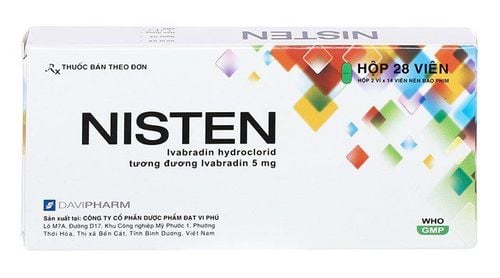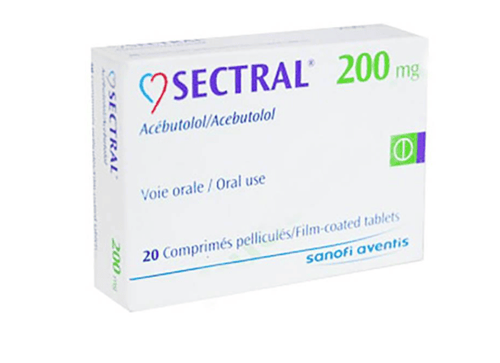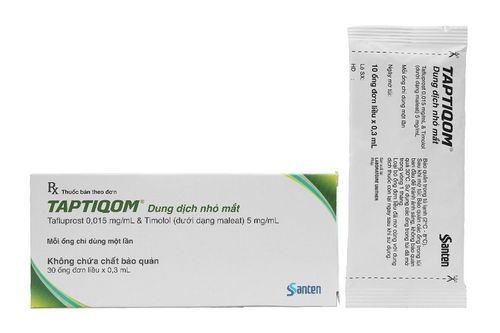This is an automatically translated article.
Coronary artery disease is a common cardiovascular disease in the elderly, characterized by narrowing of one or more branches of the coronary arteries, resulting in decreased blood flow to the heart. Let's find out what drugs to take for coronary heart disease through the article below.
1. What is coronary heart disease?
Coronary heart disease is a condition in which the main blood vessels supplying blood to the heart are narrowed or blocked by plaque, leading to reduced blood flow to the heart. Coronary artery disease can be divided into two categories, namely acute coronary syndrome and chronic coronary disease:Acute coronary syndrome includes unstable angina and acute myocardial infarction due to complete occlusion of coronary artery, acute due to plaque atherosclerosis or thrombosis. Chronic coronary artery disease occurs silently and progresses over many years, symptoms appear to increase as the coronary arteries narrow over time. Coronary heart disease causes some typical symptoms such as angina, shortness of breath, shortness of breath, fatigue, dizziness, irregular heartbeat, palpitations, etc. In which, angina or shortness of breath when Stress is a common sign. The patient has a feeling of heaviness, squeezing the chest, usually the left chest and behind the sternum. This pain usually lasts 3-5 minutes, if it lasts more than 15 minutes and occurs at rest, it is likely to have a heart attack, the patient needs to go to the emergency center immediately.
Coronary artery disease is caused by atherosclerotic plaque that narrows and blocks the coronary arteries. Factors that increase the risk of atherosclerosis are high blood pressure, diabetes, dyslipidemia, smoking,... In addition, people with the following conditions are at increased risk of cardiovascular disease. Coronary: Advanced age, family history of premature cardiovascular disease, overweight - obesity, sedentary lifestyle, frequent stress, unhealthy diet, sleep apnea, medical conditions (insufficiency) chronic kidney disease, autoimmune disease, etc.).
Treatment of coronary heart disease depends on the severity of the disease, including coronary artery disease medication, lifestyle changes, percutaneous coronary intervention (angioplasty, coronary stenting, etc.) .
2. How is coronary heart disease treated?
Coronary heart disease, if not detected and treated early, can lead to dangerous complications such as heart failure, sudden death, heart valve regurgitation, arrhythmia, etc. There are many methods of treating vascular disease. coronary artery disease, in which the most basic and optimal treatment is lifestyle change and coronary heart disease medication.
What drugs do patients with coronary heart disease take is a concern of many patients when learning about this disease. Currently used coronary artery disease drugs include antiplatelet drugs (prasugrel, aspirin, ticagrelor, clopidogrel,...), lipid-lowering drugs (pravastatin, rosuvastatin, atorvastatin,...), analgesics. angina, drugs to treat comorbidities,... Medicines for coronary heart disease need to be used properly and regularly, patients must be periodically re-examined to effectively treat and control coronary heart disease.
In addition, the patient can have percutaneous coronary intervention and stenting to widen the narrowed lumen and prevent it from becoming blocked again; or coronary artery bypass surgery. After coronary intervention, patients need to change their lifestyle and take regular coronary heart disease drugs to avoid coronary artery blockage and narrowing again.
3. What drugs do patients with coronary artery disease take?
Combination of coronary heart disease drugs and lifestyle changes is the most basic and optimal treatment in coronary artery disease. So what drugs to take for coronary heart disease to be effective?
3.1. Beta-blockers are the first class of drugs to treat coronary heart disease, especially in people with underlying diseases such as hypertension, heart failure. Beta-blockers inhibit the action of adrenaline and noradrenalin, thereby dilating blood vessels, lowering blood pressure, reducing heart rate, and reducing angina, resulting in reduced pressure on the heart in patients with coronary artery disease. Some beta-blockers such as atenolol, bisoprolol, metoprolol, propranolol, timolol,... most of these drugs are taken orally, in the morning or at bedtime. However, these drugs can cause some side effects such as fatigue, weight gain, cough, shortness of breath, cold feet and hands, slow heart rate, chest pain, heaviness in the chest, excessive lowering of blood pressure, ...
Note when using beta-blockers for coronary heart disease:
Not for pregnant women, nursing mothers, bronchial asthma, chronic obstructive pulmonary disease, congestive heart failure, liver failure, slow heart rate,... Do not arbitrarily stop taking drugs, change drugs. When experiencing side effects, consult your doctor about whether to continue taking your coronary heart disease medication. Do not use grapefruit juice before and after taking the medicine. Take the medicine at a fixed time of the day. Monitor heart rate while taking the drug. 3.2. Statin group drugs Statins are also one of the commonly used coronary artery disease drugs with the effect of lowering blood cholesterol and protecting the vessel wall through the mechanism of inhibiting the inflammatory process.
Statins are used for coronary artery disease patients with high blood cholesterol or not. Statins help prevent the formation of atheroma, reduce existing atherosclerosis, prevent dangerous complications caused by coronary heart disease such as heart failure, stroke, arrhythmia, myocardial infarction, ...
Some Statin-type coronary heart disease drugs are commonly used such as: atorvastatin, pravastatin, lovastatin, simvastatin,...
However, statins can cause some side effects during the treatment. Use process such as: Headache, muscle pain, joint pain, nausea, liver damage, hyperglycemia, rhabdomyolysis,...
Notes when using Statins for coronary heart disease:
Not for use Children under 10 years of age, pregnant and lactating women, persistent elevation of serum transaminases of unknown cause. Use caution when using for people with diabetes, thyroid, muscle, liver, kidney disease. Do not drink grapefruit juice or eat grapefruit while taking the medicine. Do not drink alcohol while taking Statins. Patients need periodic liver function tests. When blood cholesterol has returned to normal, do not stop taking the medicine without a doctor's prescription.
4. How to prevent coronary heart disease?
In addition to taking drugs to treat coronary heart disease, patients need to have a healthy lifestyle to limit the progression of the disease and prevent complications:
Diet: Eat enough and balance, limit salty foods, avoid foods high in cholesterol, fast food, canned food. If you have diabetes, you should reduce your intake of sweets and starches. Eat fish, skinless poultry, lots of fruits, vegetables, nuts, etc. Exercise regularly, at least 30-45 minutes/day, all days of the week. You can choose gentle forms of exercise such as cycling, walking, table tennis, yoga, aerobics, etc. to help improve health and reduce the risk of other diseases of the cardiovascular system. Patients need to lose weight if they are overweight or obese. Change lifestyle in a positive way: Avoid stress, limit alcohol, quit smoking, stay away from tobacco smoke,... Well treat comorbidities such as hypertension, diabetes, high blood fat, ... Strictly follow the doctor's instructions on using drugs for coronary heart disease, re-examination on time.
Please dial HOTLINE for more information or register for an appointment HERE. Download MyVinmec app to make appointments faster and to manage your bookings easily.













